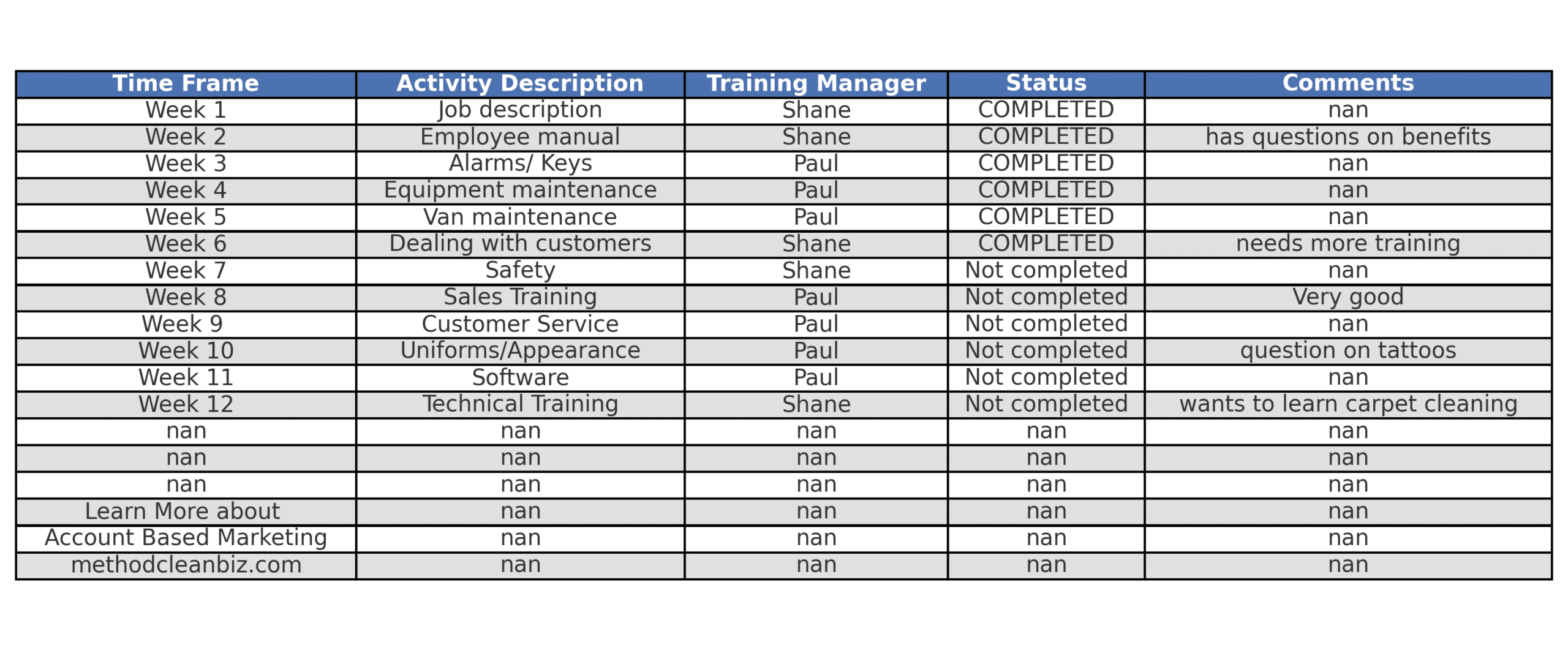Employee Training Plan for Cleaning Services
A well-structured employee training plan is the foundation of a successful cleaning business. Whether you manage a janitorial service, commercial cleaning company, or specialized floor care team, training ensures that employees perform their tasks efficiently, safely, and professionally.
Without a standardized training program, cleaning quality can vary, leading to inconsistent results, customer complaints, and higher employee turnover. A structured training plan improves service quality, increases employee confidence, and ensures that your team follows best practices in safety, customer service, and equipment usage.
This guide will walk you through creating a comprehensive training plan, covering:
✔ Identifying training needs based on different cleaning roles
✔ Setting training durations based on job complexity
✔ Assigning training managers or mentors for proper supervision
For a detailed step-by-step cleaning training manual, check out our Ultimate Janitorial and Commercial Cleaning Training Manual. 🚀
12-Week Employee Training Plan Checklist
Week 1: Onboarding & Company Policies
The first week of training is crucial for setting clear expectations and ensuring that new employees understand company policies. A structured onboarding process helps reduce turnover, improve efficiency, and set employees up for success from day one.
🔹 Job Roles & Expectations
Clearly defining job descriptions ensures that employees understand their responsibilities. Different roles, such as office cleaners, day porters, and floor care technicians, require specific skills, and setting expectations early helps maintain consistency in service quality.
🔹 Company Handbook
A comprehensive employee handbook should outline:
✔ Company policies on conduct, attendance, and performance
✔ Uniform and appearance standards (badges, dress code)
✔ Payroll and scheduling expectations
This guide serves as a reference manual to ensure employees stay aligned with company values and operational standards.
🔹 Building Access & Security
Since many cleaning jobs involve after-hours work, training employees on security protocols is essential. Topics to cover include:
✔ Handling keys and alarm systems properly
✔ Locking and securing facilities after cleaning
✔ Emergency procedures for workplace incidents
A strong onboarding process ensures that new employees are confident and prepared for their roles. For a step-by-step guide to hiring and onboarding top cleaning employees, check out The 10 Essential Steps to Hiring Amazing Employees for Your Commercial Cleaning Service.
Essential Training Modules for Cleaning Staff
A. Safety & Compliance
- Understanding cleaning chemicals and MSDS sheets
- Equipment safety: vacuums, buffers, and extractors
- Preventing workplace injuries and emergency protocols
B. Customer Service & Professionalism
- How to interact with clients professionally
- Handling customer inquiries and complaints
- Maintaining a clean and professional appearance (uniforms, badges)
C. Equipment & Cleaning Techniques
- Proper use of cleaning tools and machinery
- Preventative maintenance for company equipment
- Best practices for high-traffic areas, restrooms, and specialty surfaces
D. Sales & Upselling Opportunities
(For specialized services like carpet and tile cleaning)
- Training employees to recognize upsell opportunities
- Educating staff on additional services (floor stripping, grout cleaning)
E. Technology & Software Training
- Using scheduling software, digital checklists, and reporting tools
- Time tracking and payroll submission processes
Tracking Employee Progress & Improvement
- Maintain training logs and performance evaluations to track progress.
- Conduct regular feedback sessions to address common training issues.
- Adjust training programs based on employee needs and performance trends.
Advanced Training & Skill Development
- Encourage cross-training to enhance employee versatility.
- Provide certifications for specialized cleaning services like floor care or sanitation.
- Offer leadership training for supervisors and team leads to develop management skills.
Conclusion & Next Steps
- Reinforce the importance of structured training for consistency and quality.
- Promote continuous learning and professional development for long-term success.
- Access a comprehensive training manual for further development: Ultimate cleaning training manual.
Have questions? Contact us! 🚀

